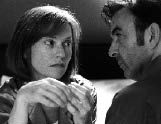A Comedy of Power
by George Sax

If Claude Chabrol isn’t the most gifted or admired of the French film artists of the late-1950s Nouvelle Vague who set out—often in collaboration with each other—to reconceive French cinema and impose a new aesthetic regime, his career’s longevity and productivity are among the very most impressive. He is still releasing films on a yearly basis and they’re generally getting wide distribution in France and at least limited release in this country: His newest, A Comedy of Power, is his 57th feature (not counting television work) in less than 50 years.
From the start, with Le Beau Serge and Les Cousins in 1958, an obliquely portrayed moral perversity is frequently found in Chabrol’s films: Bourgeois expectations and standards are confounded, shown to be flaccid and all-too-easily overcome. Increasingly, however, he seems to have come up short narratively and intellectually.
In his most recent film, The Bridesmaid, a presentation of a terribly misconceived love affair offered brief glints of oedipal obsession and a petit-bourgeois dullness of sensibility, but they were far from enough to sustain the bleak joke toward which Chabrol rather placidly worked his way.
In A Comedy of Power, the main character’s conventional but fierce ethos of duty, propriety and moral balance is more obviously contrasted with life as, Chabrol seems to be saying, it is very often navigated and accommodated.
Jeanne (Isabelle Huppert, one of Chabrol’s favorite actresses) is a Parisian investigating magistrate, brilliant, savagely efficient and effective, and unswervingly committed. She may also be spinning her wheels, or at least missing her real target: “To set an example, once and for all.”
Jeanne is pursuing corrupt high executives in a quasi-public export-promoting corporation. As she consecutively confronts these men, challenging their deals and self-dealing, demanding facts, and perhaps repentance, she is met with their polite but mildly surprised or annoyed response that their arrangements are useful, “normal” and sometimes even legal. Eventually, her own purchase on normality becomes more problematic.
Chabrol—who co-wrote as well as directed—seems to be operating out of a cynical ambivalence, and cynicism is the senior partner in this dualism. His film dutifully follows Jeanne’s investigation, and the disintegration of her private life, but what’s at stake is never very involving, and the wit is too enervated, the insights too mechanical. Chabrol seems to have worked his way deep into a mode of comfortable, distanced, posturing.
|
Issue Navigation> Issue Index > v6n6: Love Stories (2/8/07) > Film Clips > A Comedy of Power This Week's Issue • Artvoice Daily • Artvoice TV • Events Calendar • Classifieds |









 Current Issue
Current Issue